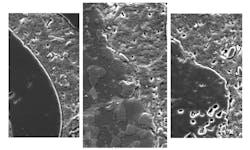Sewage-enhanced steel slag makes stronger concrete
MELBOURNE, AUSTRALIA, APRIL 9, 2020 -- Researchers have shown how a by-product of steel making can be used to both treat wastewater and make stronger concrete, in a zero-waste approach to help advance the circular economy.
Produced during the separation of molten steel from impurities, steel slag is often used as a substitute aggregate material for making concrete.
Steel slag can also be used to absorb contaminants like phosphate, magnesium, iron, calcium, silica and aluminium in the wastewater treatment process, but loses its effectiveness over time.
Engineering researchers at RMIT University examined whether slag that had been used to treat wastewater could then be recycled as an aggregate material for concrete.
The concrete made with post-treatment steel slag was about 17% stronger than concrete made with conventional aggregates, and 8% stronger than raw steel slag.
Water engineer Dr Biplob Pramanik said the study was the first to investigate potential applications for "sewage-enhanced" slag in construction material.
"The global steel making industry produces over 130 million tons of steel slag every year," Pramanik said.
"A lot of this by-product already goes into concrete, but we're missing the opportunity to wring out the full benefits of this material.
"Making stronger concrete could be as simple as enhancing the steel slag by first using it to treat our wastewater.
"While there are technical challenges to overcome, we hope this research moves us one step closer to the ultimate goal of an integrated, no-waste approach to all our raw materials and by-products."
In the study, civil and water engineering researchers found the chemical properties of the slag are enhanced through the wastewater treatment, so it performed better when used in concrete.
"The things that we want to remove from water are actually beneficial when it comes to concrete, so it's a perfect match," Pramanik said.
Civil engineer Dr Rajeev Roychand said the initial study was promising but further research was needed to implement the approach at a larger-scale, including investigating the long-term mechanical and durability properties of enhanced slag.
"Steel slag is currently not in widespread use in the wastewater treatment industry - just one plant based in New Zealand uses this by-product in its treatment approach," he said.
"But there is great potential here for three industries to work together - steel making, wastewater treatment and construction - and reap the maximum benefits of this by-product."
